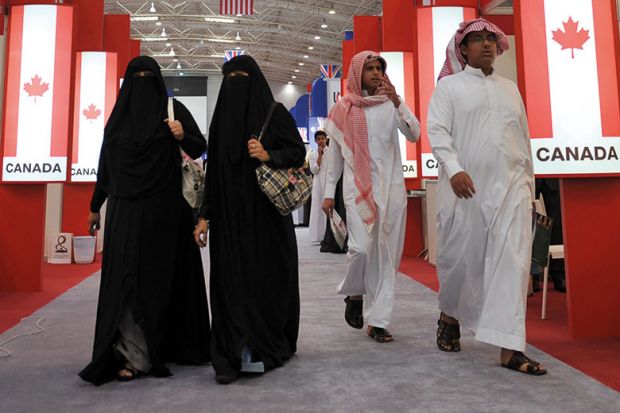Saudi Arabia’s decision to recall its students from Canada after being criticised by the nation’s government over the detention of human rights activists shows how globally mobile students can become pawns in an era of “political overreaction”, experts have warned.
Following a diplomatic spat, the Saudi government this week announced that it was withdrawing all its students from Canadian institutions, as well as expelling the Canadian ambassador from the country.
More than 12,000 Saudi students are currently studying in Canada, 7,000 of whom are on a Saudi scholarship programme, many accompanied by spouses and children.
A tweet from the Saudi Arabian Cultural Bureau in Canada said that all students, including those paying for their own education, should prepare to leave the country by the end of the summer.
The move came in response to criticism of the Saudi government’s arrest and detention of civil society and women’s rights activists in tweets by Canada’s foreign affairs minister, Chrystia Freeland, and the ministry’s account.
In a broadcast on state-run TV, a Saudi government representative said that it was planning to accommodate the students currently in Canada in “excellent countries such as the US, the UK, Australia and New Zealand”.
However, experts have warned that relocating so many students to other international destinations, particularly so close to the start of a new academic year, would be highly problematic.
Philip Altbach, founding director of the Center for International Higher Education at Boston College, said that Saudi students would have to “find a country and an institution that would accept them, get their records sent to the appropriate place, as well as ensure they can study what they had been studying. These are not easy things to do.
“It is an overreaction from the Saudis. But this is an era of political overreaction, and higher education is not excluded,” he added.
Chris Davidson, reader in Middle East politics at Durham University, agreed. The students “can’t just seamlessly move from Canada to the UK, for example, it would be complicated and expensive”, he said.
Dr Davidson added: “I don’t believe that’s their [the Saudi government's] intention. They want to trim their bloated higher education budget by reducing the amount of students they pay to send to the West."
And the move may “also be serving as a warning shot from Saudi Arabia to other countries, such as the US and the UK, not to attempt the sort of public criticism that the Canadian minister expressed”, he said.
Dr Davidson continued: “It’s not a good thing for these young Saudis. It’s a bad thing for Canadian institutions who rely on their tuition fees, particularly for smaller institutions, and it’s a very bad thing for higher education links from Saudi to Canada.”
However, Professor Altbach said that Canadian institutions could ride out the mass withdrawal of Saudi students. “If any country can, it’s Canada; their international student numbers are going up,” he said. “They [Canadian universities] would be less dramatically affected financially in the long term than others, but will suffer a hit in the short term.”
Simon Marginson, director of the UCL-based Centre for Global Higher Education, said that the withdrawal “harms the interests of thousands of Saudi nationals, as well as their Canadian hosts”, but in terms of “education and cultural exchange, rather than income”.
“We have to ask ourselves whether globally mobile students should be kicked around as ‘political footballs’ in international disputes over human rights or other such tensions,” Professor Marginson added. “The students are blameless in the dispute, yet they become victims of it.”
Register to continue
Why register?
- Registration is free and only takes a moment
- Once registered, you can read 3 articles a month
- Sign up for our newsletter
Subscribe
Or subscribe for unlimited access to:
- Unlimited access to news, views, insights & reviews
- Digital editions
- Digital access to THE’s university and college rankings analysis
Already registered or a current subscriber?








